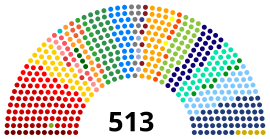Chamber of Deputies (Brazil)
| logo | Congress Palace |
|---|---|

|

|
| Basic data | |
| Seat: |
Palácio do Congresso Nacional in Brasília plenary hall : 
|
| Legislative period : | four years currently 2019–2023 |
| MPs: | 513 |
| Current legislative period | |
| Chair: |
Rodrigo Maia ( DEM ), (since July 15, 2016) |
Distribution of seats in the 56th legislative period with 25 parties:
|
|
| Distribution of seats: |
Government bloc:
|
| Website | |
| www2.camara.leg.br (Chamber of Deputies) | |
The Chamber of Deputies of Brazil ( Portuguese Câmara dos Deputados do Brasil ) is next to the Federal Senate of the Legislature of the two-chamber system in Brazil , which together form the National Congress form. It consists of 513 elected MPs.
A term of office is four years. The elections are based on a complex system of proportional representation in which votes for a party and votes for candidates from that party are added together. From this the seats to which this party is entitled are determined and the candidates with the most individual votes come to the Chamber of Deputies. The seats are distributed in proportion to the population of the states, but each state has a minimum of 8 seats and a maximum of 70 seats. The system is thus weighted in favor of the smaller states. As a result, a voter from the smallest state of Roraima has about as much influence as eight to nine voters from São Paulo . The basis is the Brazilian constitution of 1988 ( Constituição Federal de 1988 ).
| running | Legislative period | Duration | |
|---|---|---|---|
| 1 | 48th legislative period | 1987 | 1991 |
| 2 | 49th legislative term | 1991 | 1995 |
| 3 | 50th legislative term | 1995 | 1999 |
| 4th | 51st legislative term | 1999 | 2003 |
| 5 | 52nd legislative term | 2003 | 2007 |
| 6th | 53rd legislative period | 2007 | 2011 |
| 7th | 54th legislative period | 2011 | 2015 |
| 8th | 55th legislative term | 2015 | 2019 |
| 9 | 56th legislative period | 2019 | 2023 |
Chamber of Deputies 2015–2019 (55th legislative period)
The penultimate elections in Brazil took place on October 5, 2014.
Acting interim President, previously First Vice President, was Waldir Maranhão from the Partido Progressista (PP) from May 5, 2016 to July 14, 2016 , who replaced the previous President Eduardo Cunha after his impeachment. At the same time, Fernando Giacobo of the Partido da República (PR) took over as first vice-president , and second vice-president at the beginning of the 55th legislative period. On July 14, 2016, Rodrigo Maia of the Democratas (DEM) took over the presidency and was re-elected for the period 2017 to 2019.
The 55th legislative period lasted from February 1, 2015 to January 31, 2019.
Chamber of Deputies 2019-2023 (56th legislative period)
The last MPs elections for the 56th legislative period took place in the 2018 elections in Brazil on October 7, 2018, in which all 513 MPs stood for election. The 56th legislative period lasts from February 1, 2019 to January 31, 2023. A new presidium was only formed on February 1, 2019.
At the beginning of the 56th electoral term on February 1, 2019, Rodrigo Maia took up his third term in a row as President of the Chamber, he was re-elected with 334 votes.
In the Chamber of Deputies, Bolsonaro's government is based on a coalition of a total of 14 parties that represent a broad political spectrum of social democratic ( SD ), liberal ( PODE ), liberal-conservative ( MDB , PTB ), economically liberal ( NOVO , PL ), conservative ( DEM , PSD ), national conservative ( PP , PRTB ), right-wing religious ( PRB , PSC ), nationalist ( PSL ) and Christian fundamentalist ( PATRI ) programs. Such large coalitions are not uncommon in Brazil.
After the 2018 election, two parties are now appearing with a new name: the Partido da República (PR) as Partido Liberal (PL) and the Partido Popular Socialista (PPS) as Cidadania (CIDA).
Web links
- House of Representatives website
- Literature from and about the Chamber of Deputies (Brazil) in the catalog of the Ibero-American Institute of Prussian Cultural Heritage, Berlin
- Literature from and about the Chamber of Deputies (Brazil) in the bibliographic database WorldCat
Individual evidence
- ^ Constituição Federal (Brazilian Portuguese).
- ↑ Eleições 2014: Resultados para Deputado Federal (1º turno) , election results of the candidates (Brazilian Portuguese).
- ^ Mariana Oliveira, Renan Ramalho: Ministro do STF afasta Eduardo Cunha do mandato na Câmara. In: O Globo G1. Retrieved May 10, 2016 (Brazilian Portuguese).
- ^ Resultados e lista de candidatos a Deputado Federal 2018. In: eleicoes2018.com. Eleições 2018, accessed October 31, 2018 (Brazilian Portuguese).
- ↑ Rodrigo Maia é reeleito presidente e comandará Câmara até 2021. In: globo.com. G1, February 1, 2019, accessed July 24, 2019 (Brazilian Portuguese).
- ↑ Aprovada alteração do nome do Partido da República (PR) para Partido Liberal (PL). In: jus.br. www.tse.jus.br, May 7, 2019, accessed July 13, 2019 (Brazilian Portuguese).
- ↑ PPS aprova mudança de nome e vai se chamar Cidadania - Política. In: com.br. Estadão, March 23, 2019, accessed July 13, 2019 (Brazilian Portuguese).
